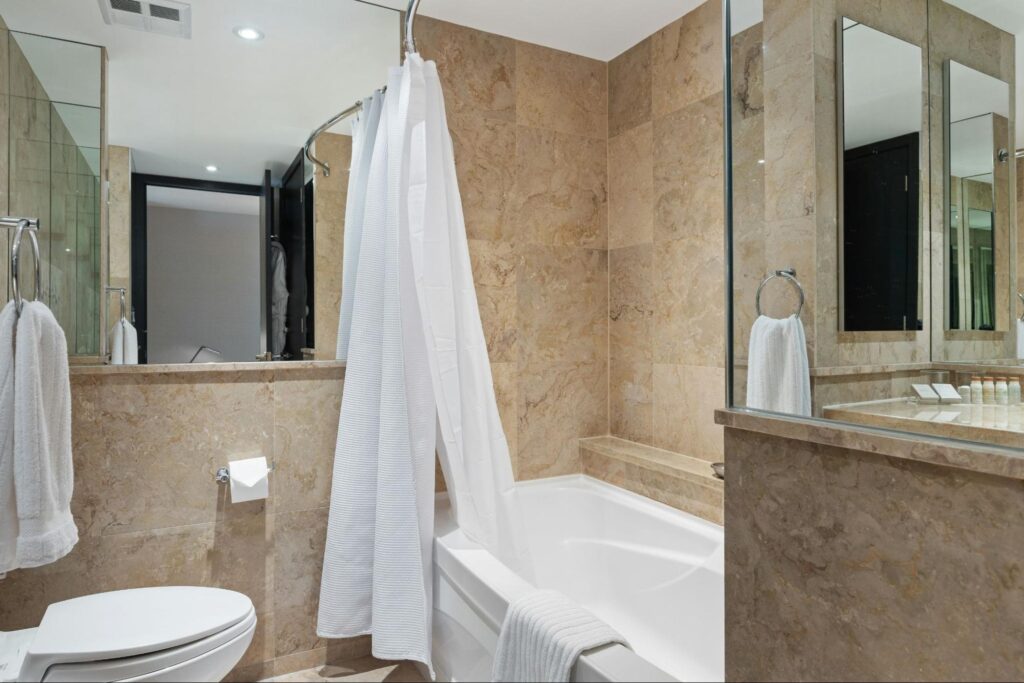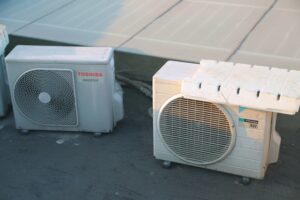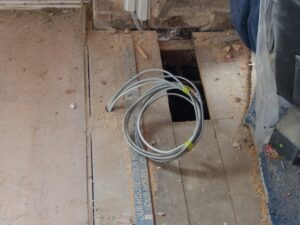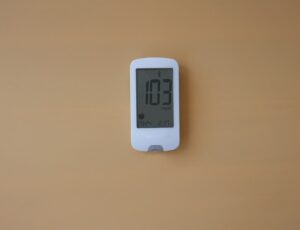Imagine turning on your faucet and instantly getting hot water without a wait.
A hot water heater booster pump makes this convenience possible by quickly cycling water from your heater to your tap. This device ensures that hot water is available on demand, saving both time and water. This innovation is perfect for households tired of wasting water while waiting for it to heat up.
At Excel Mechanical, our team is dedicated to helping you easily achieve this comfort level. Our experts tailor solutions to your specific requirements and budget, ensuring optimal performance and efficiency. With our high-quality services, you can trust that we’ll provide the best setup for your needs.
Not only do we specialize in installation and maintenance, but our commitment to excellence means you’ll always receive top-notch support and advice. We are here to ensure your home or business HVAC and plumbing systems are as efficient and reliable as possible.
In this blog, we will talk about:
- The importance of having a hot water heater booster pump in your home.
- How the right booster pump can enhance your water flow and reduce waste.
- Tips on choosing the best booster pump for your needs.
Let’s find out!
Understanding Water Heater Booster Pumps
Water heater booster pumps can solve the problem of an insufficient hot water supply in your home. These devices increase water pressure, ensuring a better flow of hot water to your taps and showers.
How They Work
Booster pumps enhance the pressure of water leaving your heater. This ensures that hot water reaches your fixtures faster and with more force. You get an improved experience, especially in larger homes where water pressure can drop.
Installation and Benefits
- Easy Installation: Most booster pumps are simple to install and can be added to existing systems without extensive modifications.
- Consistent Supply: These pumps provide a continuous and consistent hot water supply, even during peak usage times.
Choosing the Right Booster Pump
When selecting a booster pump, consider the size of your water heater and your household’s specific needs. We offer expert guidance to help you choose the right pump, ensuring top performance and great value.
Types of Booster Pumps
Booster pumps help improve water pressure in your hot water system. There are different types designed for various needs. Understanding the options allows you to choose the right kind for your situation, whether automatic or manual.
Automatic Booster Pumps
Automatic booster pumps activate when they detect a drop in water pressure.
Once installed, these pumps are convenient because they require little intervention. They have sensors that manage the pump’s operation, ensuring consistent water pressure. With automatic pumps, you don’t have to manually adjust settings.
These pumps are ideal for homes or businesses where water use varies daily. Maintaining optimal pressure enhances the efficiency of your hot water system.
Manual Booster Pumps
Manual booster pumps require user intervention to operate.
You must turn them on or off based on your water pressure needs. This type allows more control over when the pump runs, which can benefit budgeting energy use.
Manual pumps are often more affordable, making them a good choice for managing costs. Their simple design leads to easy maintenance and fewer technical issues.
Benefits of Installing a Booster Pump
Installing a booster pump can significantly improve your hot water system’s performance. Your daily tasks become more efficient and comfortable with enhanced water pressure, energy savings, and consistent temperatures.
Increased Water Pressure
Many homes and businesses struggle with low water pressure, making showers less enjoyable and dishwashing a hassle. A booster pump resolves this by ensuring adequate water pressure throughout the building.
You will find showers more satisfying, and water reaches faucets faster. This can be particularly beneficial in larger homes or older buildings where water pressure naturally diminishes due to distance or pipe limitations.
Energy Efficiency
A booster pump can save energy by optimizing your hot water system.
It allows your heater to work less, delivering water more effectively at the desired pressure.
The result is a system that runs more efficiently, reducing energy consumption. This can lead to lower utility bills over time. By investing in a booster pump, you not only enhance your water system but also save money.
Consistent Water Temperature
Temperature fluctuations in your hot water supply can be frustrating, leading to unpredictable shower experiences. A booster pump helps maintain steady water temperatures by ensuring a constant flow to your taps and showers.
This consistency means you spend less time adjusting the temperature and more time enjoying your activities. It also reduces the strain on your water heater, potentially extending its lifespan.
Selecting the Right Booster Pump
When choosing a booster pump for your water heater, key factors include compatibility with your water heater, pump capacity, and the quality and durability of the pump. These elements ensure efficient performance and long-term reliability.
Compatibility with Water Heater
Ensuring your booster pump is compatible with your existing water heater is crucial.
Check the specifications of both the pump and your water heater to confirm they can work together. Compatibility ensures smooth operation and prevents potential damage to equipment.
Look into how the pump connects to the heater and the necessary fittings.
If you’re unsure, contact professionals like Excel Mechanical, known for its expertise in HVAC and plumbing systems. We can help you choose a system that fits your specific needs.
Pump Capacity
Consider the booster pump’s capacity, as it should match the demand of your household or commercial space.
Capacity determines how much extra pressure and flow the pump can provide. This is especially important if you live in a multi-story building or your family uses hot water simultaneously.
A pump with insufficient capacity may not meet your needs, while one that’s too powerful could lead to unnecessary energy consumption.
You need a balanced choice to ensure optimal performance without wasting resources.
Quality and Durability
Invest in a booster pump known for its quality and durability.
This prevents frequent replacements and maintenance, saving you time and money. Look for models made with high-quality materials and backed by a solid warranty to ensure long-term use.
It is also essential to choose a reputable installer. As residential and commercial systems specialists, we ensure every installation is up to the highest standards and tailored to your needs and budget.
Installation Process
When installing a hot water heater booster pump, it’s crucial to decide whether to do it yourself or hire professional help. We’ll explore both options, basic installation steps, and key safety considerations.
DIY Vs. Professional Installation
If you’re considering a DIY installation, having experience with plumbing and electrical work is essential. It could save you some money, but if you’re unsure, it might lead to extra costs if mistakes are made. The process requires wrenches, screwdrivers, and possibly a soldering kit.
On the other hand, hiring a professional ensures the job is done correctly and safely. We provide exceptional quality with our expert teams, matching the system to your needs and budget. Our professionals can handle unexpected problems during installation, ensuring everything functions smoothly.
This peace of mind might outweigh the cost difference for many homeowners.
Basic Installation Steps
Start by turning off the power to your water heater to avoid electrical shocks.
You’ll then need to drain the tank by connecting a hose to the drainage valve. Once it’s empty, disconnect the water lines and remove the existing system if needed.
Position the booster pump and secure it following the manufacturer’s guidelines. Reconnect the water lines, ensuring they are tight to avoid leaks. Then, return power to the unit and check for any issues.
Sometimes, installation involves changes to the piping system. A professional installation can save time and frustration if you feel uncertain about steps like soldering or complex connections.
Safety Considerations
Safety is paramount during installation.
Turn off the electrical power and water before beginning.
Use appropriate personal protective equipment, such as gloves and goggles, to prevent injuries. Ensure all connections are tight and free from potential leaks, which could cause water damage.
Be aware of the booster pump’s electrical requirements. Overloading circuits can pose a fire risk. If you don’t feel confident checking these components, consider professional help.
Professionals have the expertise to safely install and check systems for potential hazards, letting you enjoy your boosted hot water system worry-free.
Maintenance and Troubleshooting
Proper care of your hot water heater booster pump helps keep it running smoothly and prolongs its lifespan. Addressing both routine upkeep and common problems ensures the efficiency of your system.
Routine Maintenance
Regular maintenance is essential for a hot water heater booster pump.
You should check the pump’s connections and inspect for leaks every few months. Cleaning any accumulated debris helps maintain optimal operation. It’s also vital to replace worn-out parts promptly to prevent failures.
Monitoring the pressure settings helps avoid unnecessary strain on the pump and ensures consistent water flow. Keeping an eye on electrical components, such as the power cord and plug, prevents potential hazards.
Scheduling annual professional inspections can catch issues early, ensuring reliable performance.
Common Issues and Solutions
Problems such as unusual noises or water pressure drops are common with booster pumps.
If you hear strange sounds, the pump may be clogged or have a loose part. Investigating and clearing any blockages often resolves noise issues. A consistent pressure drop usually indicates a leak in the system or a failing part.
Addressing leaks involves checking the seals and valves for integrity and replacing faulty components. If these solutions don’t resolve the issues, it might be time to call experts. Our team provides exceptional HVAC and plumbing solutions, ensuring that your needs are met with quality and value in mind.
Our professionals can diagnose and fix issues efficiently, catering to residential and commercial systems.
Considerations for Energy Efficiency and Sustainability
When thinking about adding a hot water heater booster pump, energy efficiency should be a top concern.
Choosing an energy-efficient pump reduces electricity use, lowering utility bills and your carbon footprint. Look for pumps with an Energy Star rating or similar certifications to ensure better energy use.
Consider the materials used in the pump. To minimize environmental impact, opt for ones made from durable, eco-friendly materials. To save water, select a pump with a timer or smart sensor. These features allow the pump to run only when needed, conserving water and energy.
Installing a recirculation system with your booster pump can also help you get hot water faster, reducing water waste. You can find more about this system through our article on how hot water recirculation pumps work.
Professional installation is key to accurate installation and maximum efficiency.
Building Codes and Regulations
When installing a hot water heater booster pump, you must consider building codes and regulations. These codes ensure safety and efficiency and vary by region. It’s important to check local requirements before starting any project.
Common Requirements:
- Permits: Sometimes, a permit is needed for installation. Check local government offices for details.
- Safety Standards: Your installation must meet specific safety criteria to prevent accidents.
Different areas have specific mandates on wiring, placement, and pump size. Following these ensures your system operates efficiently and legally. Failure to comply can lead to penalties or safety hazards.
Always consult professional experts if unsure about regulations.
Cost Analysis and Budgeting
Understanding costs is crucial when considering a hot water heater booster pump.
- Initial Costs include the price of the pump itself and installation fees, which can vary depending on the model and your location. It’s important to plan for both equipment and professional installation costs.
- Ongoing Costs involve electricity consumption and maintenance. Boosters may increase energy bills slightly, so monitoring your usage is wise. Regular maintenance ensures efficiency and prolongs the pump’s lifespan, saving money in the long run.
Comparing different brands and models is a budget-friendly option. Look for energy-efficient pumps to reduce utility bills. When choosing the right system for your home, consider long-term savings versus short-term expenses.
Financing Options might be available. Some providers offer payment plans or rebates, making it easier to manage costs. Investigate whether such options can help you afford the initial investment more comfortably.
Here’s a cost breakdown to guide your budgeting:
| Type | Estimated Cost Range |
| Pump Price | $200 – $800 |
| Installation | $150 – $500 |
| Maintenance | Varies |
Excel Mechanical stands out for its exceptional service and dedication to cost-effective solutions, ensuring you get the best system for your home or business.
Frequently Asked Questions
We get it—when you’re considering a hot water heater booster pump, you likely have a lot of questions. After all, it’s an important upgrade that can improve your home’s efficiency. Here are some common questions to help guide your decision-making process.
How does a hot water heater booster work?
A hot water heater booster pump increases the water flow within the heater system. It recirculates hot water to keep it readily available, reducing waiting time and enhancing convenience.
What are the benefits of installing a booster pump for a water heater?
Benefits include faster hot water delivery and reduced water waste, which results in lower energy bills and a more sustainable household. A booster pump can also extend the life of your water heating system by reducing stress on its components.
What are the signs that I might need to replace my water heater booster pump?
Common signs include unusual noises, reduced water pressure, and inconsistent hot water delivery. If you notice these issues, it may be time to consider replacing or maintaining your booster pump.
How do I choose the best booster pump for my hot water heater system?
Consider factors like water demand, energy efficiency, and compatibility with your system. A professional consultation can help tailor the choice to your needs and budget. Excel Mechanical offers expert advice and services to ensure you get the right fit for your home.
Can a booster pump improve water pressure for a natural gas hot water heater?
Yes, a booster pump can enhance water pressure for natural gas hot water heaters. Increasing the flow rate provides a consistent and strong water supply, making it more efficient for daily use.
Where should a booster pump be installed in a hot water heater system?
The booster pump is typically installed near the water heater or at the point of use. Correct installation is crucial for optimal performance. Our Excel Mechanical team excels in residential and commercial installations, ensuring reliable and effective operations for your system.




